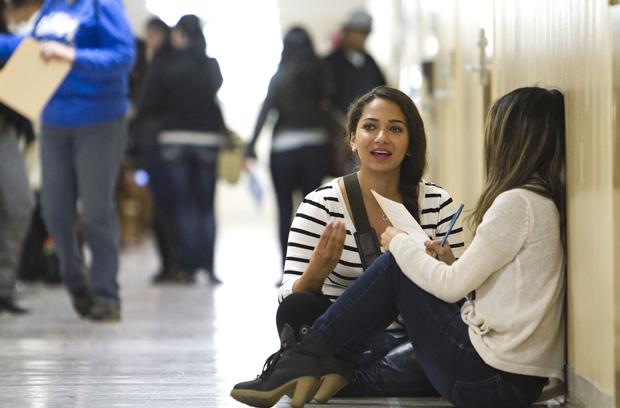
Everyday on campus, a group of volunteers for the CSUN HelpLine sit in a room answering calls come from individuals suffering from depression and relationship issues. They also come from people questioning their sexuality, contemplating suicide and victims of domestic violence.
The callers, who can remain anonymous, are often are searching for someone to take the time to listen without judging them.
Victor Gone, 22, a senior majoring in psychology, volunteered because he wanted to help outside of the classroom.
“I wanted to apply topics I learned in psychology classes on an everyday basis,” he said. “It feels really good helping people instead of hearing it in books.”
The HelpLine serves the campus community and San Fernando Valley by helping individuals struggling with abuse and domestic violence, addiction and more.
The organization is composed of trained volunteers that offer counseling, emotional support and motivate individuals to take control of their life.
Marshall Bloom, clinical psychologist and adviser of CSUN HelpLine, said the service has been in existence since 1990 and there are a large number of student volunteers, but not all are students.
“Roster is at 100 plus which is a large number of listeners,” Bloom said.
CSUN HelpLine Training Director Ali West said calls received range from individuals being lonely, abused, raped, battling with sexual issues or suicidal.
Volunteers are trained to help individuals in a crisis and find solutions, whether it is depression, loneliness, anxiety or confusion of any sort.
“You’d be surprised how many people are going through intense things and feel uncomfortable talking to people close to them,” said Bernice Contreras, 23, CSUN alumna and HelpLine volunteer. “Having a helpline gives them the opportunity to anonymously talk about their lives.”
Bloom said the Helpline generally receives a consistent flow of calls, especially during stressful times like finals and holidays when people might be feeling depressed.
Senior Chrishaun Bradford, 21, a psychology major and HelpLine volunteer, said it is extremely vital to have a helpline on campus because it allows individuals the opportunity to help themselves get through recurring illnesses.
“Our callers are being heard, and in extreme cases led to safety, which is most important,” Bradford said.
Tina Maskan, 25, a senior psychology major and HelpLine volunteer, said there is a need for the HelpLine because it allows students to gain experience and develop communication skills.
“Shockingly a lot of people are isolated throughout their lives and it’s good to talk to people and vent,” she added.
Volunteers do not receive monetary compensation and do not need any prior experience.
Bloom said Associated Students provide funding for the HelpLine in basic budgetary categories, including phone lines, supplies, publicity and general training.
There is a 10-week training course volunteers must undergo to ensure they are well prepared to listen to and motivate individuals in a crisis to take control of their life.
“We break trainers and trainees in groups and they do mock role plays that last from three to five minutes,” West said. “There are two rounds of example calls and trainers give trainees feedback.”
Training lasts as long as needed but trainers aim to finish in four hours every Thursday starting at 7 p.m.
Once training is completed, all volunteers have a nine-hour a month commitment for one year.
Members of the HelpLine create a positive environment in the call center.
“The atmosphere is a bunch of people that are warm, sympathetic, caring and sincerely want to help people,” West said. “Everyone comes from different areas of life wanting to share stories.”
“I wanted to volunteer because I have a passion for valuing the emotional and physical needs and capabilities of human beings,” Bradford said. “Rather than judging a book by its cover, I enjoy reading every page front to back.”
